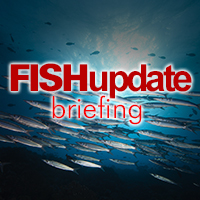Fish Update Briefing, Friday, June 22

ICELAND SET TO RESUME WHALING
ICELAND is to resume whaling following a two-year moratorium and in spite of strong protests from conservation groups, which have been calling for a ban on Icelandic seafood products. One boat has left for the hunting grounds and another will join the hunt next week. The quota for fin whale this year has been set at 161 mammals, but it can rise to 200 whales because part of a previous quota has been transferred over. The government says the number of fin whales around Iceland has never been higher and is estimated to number at least 41,000 individuals. Japan remains a major buyer of Icelandic whale meat.
VIETNAM EXPORTS TO EU DECLINE
EXPORTS of Vietnamese seafood to the European Union, including the UK, have fallen recently. One reason given by the ViệtNam Association of Seafood Exporters and Producers (VASEP) was the shortage of EU compliant raw materials. In April, ViệtNam’s tuna exports to the EU fell by 10 per cent year-on-year, while squid and octopus exports decreased by 41 per cent and mollusc exports went down by 19 per cent, VASEP said. VASEP general secretary Trương Đình Hòe said the decline was due mainly to a shortage in raw materials for processing. VASEP also said the yellow card placed on Vietnam by the EU last year over illegal and unregulated fishing was having an effect.
ELDERLY CONNED INTO PAYING £200 FOR FISH
OLDER residents in the Bolton area of north west England are being charged more than £200 for the fish they buy in a carefully planned scam operation, says the local paper, the Bolton Evening News. The residents are persuaded to buy two or three bags of unlabelled fish, which they think will only cost them a few pounds. But they do not realise until they get a bank statement that amounts of £200 and more are being put into a hand held card reader. Now trading standards officers in Wirral and Salford have issued a warning in case the scammers move to another location. They are also warning people not to buy fish on the doorstep unless they know the seller.
FISH WITH HUMAN LIKE TEETH CAUGHT
A FISH with human like teeth has been causing something of a stir on Facebook. The photo was posted as a bit of fun by the South Carolina Department of Natural Resources to find out if the public knew what it was. Several people correctly identified it as a sheepfish, which can grow to a size of around three feet. They are usually found in the Gulf of Mexico region and off the Atlantic. ScienceABC.com say they have a hard mouth and stubby teeth that look similar to human molars.

